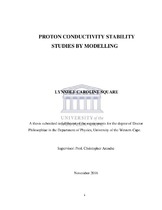| dc.description.abstract | In this thesis, some of the challenges experienced by high temperature polymer electrolyte
membrane fuel cells are explored through material modelling techniques. A very important
aspect for a fuel cell is that it should have high proton conductivity. As hydrogen enters a
fuel cell it gets broken down into its constituents, protons and electrons. The electrons
travel to an external load, whilst the protons travel through a diffusive layer, catalyst layer
and membrane area, before recombining with oxygen to form water and leave the system.
In this particular study, polytetrafluoroethylene and carbon form the diffusive layer,
platinum the catalyst and poly(2,5-benzimidazole) doped with phosphoric acid the
membrane area. The effects to proton conductivity are investigated as a result of the
mixing of materials and adsorption of the phosphoric acid on the platinum active sites. A
third study as an alternative avenue for proton conductivity improvements, is also
explored. The results from these investigations promotes the idea that
polytetrafluoroethylene, which is found in the ionomer layer, should be replaced as its
mechanical properties decrease significantly with increase in temperature. Increasing
pressure would further promote proton transfer over the doped polymer membrane region. | |

